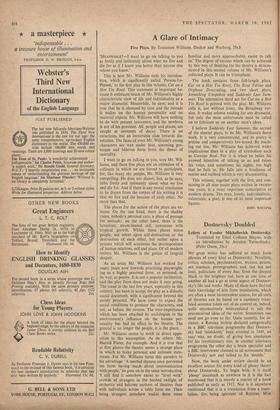Dostoevsky Doubled
Letters of Fyodor Mikhailovich Dostoevsky. Translated by Ethel Colburn Mayne, with an introduction by Avrahm Yarmolinsky. (Peter Owen, 35s.)
No great writer has suffered so much from phonies of every kind as Dostoevsky. Novelists, critics, scholars, psychoanalysts, mystics, priests, sex maniacs, pornographers and, last but not least, politicians of every hue, from the deepest black to the brightest red, have at one time or another all had a go at some aspect of Dostoev- sky's life and works. Many of them have derived their knowledge of him from translations, which are often a most inconvenient source, for all sorts of theories can be based on a carelessly trans- lated sentence taken out of its context or, indeed, quite unconsciously mistranslated to suit the preconceived ideas of the writer. Sometimes one need not go even so far. Quite recently, for in- stance, a Russian bishop declared categorically in a BBC television programme that Dostoev- sky had 'mistakenly' been arrested in 1849, an easy way, no doubt, of giving him absolution for his revolutionary sins; in another television programme the other day a brain specialist and a BBC interviewer claimed in all seriousness that Dostoevsky saw and talked to his 'double.'
Now, the book under review should be an excellent source for every kind of phony theory about Dostoevsky. To begin With, it is itself 'phony' inasmuch as nowhere in it is the fact mentioned that it is merely a reprint of a book published as early as 1917. Nor is it anywhere mentioned that it is a translation from a trans- lation, for, being ignorant of Russian, Miss
Mayne had used a German translation for her English version. This becomes clear from the German transliteration of Russian names, but also from a passage in which we get Dostoevsky writing to a friend from Moscow: 'I drink Schnaps,' or from the appearance a little farther on of St. Dimitry of Rostov under the guise of a German nobleman, 'Demetrius von Rostov.'
Two examples will suffice to illustrate what might be charitably called the scholarly aspect of this translation. One page 157 Miss Mayne ex- plains in a footnote that Paul the Prussian to whom Dostoevsky refers also on page 191 is `Paul I, so called because of his love. of all things German.' Of course, Dostoevsky actually happened to be talking about a former Old Be- liever, nicknamed Paul the Prussian because he had been sent by his sect to Prussia to found a monastery near the Russian frontier, who to Dostoevsky's delight had gone over to the Or- thodox faith in 1868. Another example of Miss Mayne's ignorance of Russian literary back- ground will be found on page 18, where she makes Dostoevsky write to his brother : 'Don't bear me as Ivan Ivanovich Pererepenko did to Gogol,' instead of: 'Don't be an Ivan Ivanovich Pererepenko': that is, a character in one of Gogol's stories.
Miss Mayne's translation is of the same quality as her knowledge of Dostoevsky's historical- literary background. A few examples taken at random from different parts of her book will suffice. `So I'm in the empyrean and three months hence I'll tell you in person of all my experi- ences' (page 34) instead of Tve crashed into high society and I'll tell you all about my adven- tures when I see you in three months' time; . . For their contentment is that of cloistered self-castration' (page 44) instead of . like monastic self-castigation'; . the story, like
Goliadkin, will be a self-confession, though different in tone' (page 45) instead of 'the story will be written in the first person singular.' Quite likely it was a similar mistranslation of this last that led the BBC brain specialist to identify Goli- adkin, the hero of The Double, with Dostoevsky. `At bottom the whole movement is but a repe- tition of the Russian delusion that men can reconstruct the world by reason and experience' (page 218) instead of (`As a matter of fact, it is the same Rousseau all over again and the dream of recreating the world by reason and experi- ment'—this almost reads like a deliberate mis- construction of the Dostoevsky text.
This book contains extracts (some acknow- ledged as such, but mostly not) from only seventy-seven letters, as against the 930 letters published in Moscow between 1928 and 1959 (the fourth and final volume only became avail- able in the winter of 1961). It also contains some recollections of Dostoevsky by a few of his friends and a small number of extracts from letters with views on Dostoevsky by his con- temporaries. It is preceded by an introduction in somewhat pompous prose by Mr. Avrahm Yarmolinsky, the author of a life of Dostoev- sky, who also for some reason does not consider it necessary to mention the rather important fact that the book is merely a reprint of a ver- sion published forty-five years ago. Since 1917, however, quite a number of English translations of Dostoevsky's letters have been published and one can only hope that one day a carefully edited and translated edition of the complete letters of Dostoevsky will be published in English and so do away once and for all with all the nauseating rubbish that one so often reads about him.
DAV ID MAGARSHACK















































 Previous page
Previous page